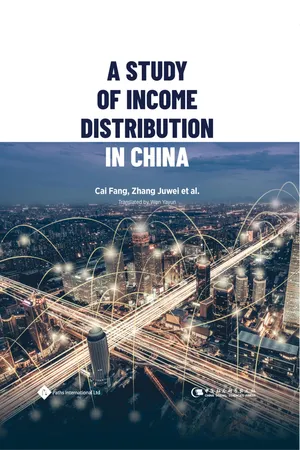
- 393 pages
- English
- PDF
- Available on iOS & Android
eBook - PDF
A Study of Income Distribution in China
About this book
As the country with the fastest economic growth in the world, China is faced with the extremely complex income distribution showing both the commonalities of market economies with rapid development and the particularity of China's institutional mechanism. To study and understand income distribution, it is not only necessary to start with the general law of the development of market economy but with China's unique system and mechanism. Otherwise, it will be difficult to clearly depict the essence of China's income distribution. This book is the result of the major project of the National Social Science Fund. This project on China's income distribution, one of the four major issues when central government leaders came to the Chinese Academy of Social Sciences in spring festival of 2011, becomes the task of the Institute of Population and Labor Economics. According to the plan, the project was aided by experts from other institutes of the Academy of Social Sciences and well-known experts from other institutions outside the Academy of Social Sciences. China's implementation of a socialist market economy determines that China's income distribution has its own unique law in marketization. China's basic economic system changes into public ownership as its main body with a variety of economic components developing together, requiring its income distribution to change into distribution according to both work and its production factors. Therefore, from the perspective of distribution system, China has both its commonalities and particularity compared with other market economies. Among them, distribution according to production factors reflects the distribution law of market economy and distribution according to work reflects the distribution characteristics of socialist public economy. Different distribution modes will inevitably result in different distribution. China's income distribution shares that of average market economy and particularity of its basic economic system. These two is intertwined and influence each other, thus leading to the complexity of China's income distribution. With the transition from planned economy to market economy, China's basic economic system has changed from single public ownership to public ownership as the main body with a variety of economic components developing together and the distribution system has also changed from distribution according to work into distribution according to both work and various production factors. In this process, the relatively average income distribution pattern according to work formed under public ownership will be broken and the distribution mechanism of contribution according to production factors will be gradually formed with the income gap widening, giving rise to serious income distribution.
Frequently asked questions
Yes, you can cancel anytime from the Subscription tab in your account settings on the Perlego website. Your subscription will stay active until the end of your current billing period. Learn how to cancel your subscription.
No, books cannot be downloaded as external files, such as PDFs, for use outside of Perlego. However, you can download books within the Perlego app for offline reading on mobile or tablet. Learn more here.
Perlego offers two plans: Essential and Complete
- Essential is ideal for learners and professionals who enjoy exploring a wide range of subjects. Access the Essential Library with 800,000+ trusted titles and best-sellers across business, personal growth, and the humanities. Includes unlimited reading time and Standard Read Aloud voice.
- Complete: Perfect for advanced learners and researchers needing full, unrestricted access. Unlock 1.4M+ books across hundreds of subjects, including academic and specialized titles. The Complete Plan also includes advanced features like Premium Read Aloud and Research Assistant.
We are an online textbook subscription service, where you can get access to an entire online library for less than the price of a single book per month. With over 1 million books across 1000+ topics, we’ve got you covered! Learn more here.
Look out for the read-aloud symbol on your next book to see if you can listen to it. The read-aloud tool reads text aloud for you, highlighting the text as it is being read. You can pause it, speed it up and slow it down. Learn more here.
Yes! You can use the Perlego app on both iOS or Android devices to read anytime, anywhere — even offline. Perfect for commutes or when you’re on the go.
Please note we cannot support devices running on iOS 13 and Android 7 or earlier. Learn more about using the app.
Please note we cannot support devices running on iOS 13 and Android 7 or earlier. Learn more about using the app.
Yes, you can access A Study of Income Distribution in China by Fang Cai,Juwei Zhang, Yayun Wei in PDF and/or ePUB format, as well as other popular books in Economics & Economic Theory. We have over one million books available in our catalogue for you to explore.
Information
Table of contents
- Cover
- Title
- Content
- Preface
- Chapter I China’s Income Trap and Middle-Income Trap
- Chapter IIManifestation and Essence of China’sIncome Distribution Problem ----FactorCapitalization and Unfair Distribution
- Chapter IIIChanges and Problems in China’s LaborShare
- Chapter IVWage Changes and Wage Growth inChina: Should Wage Grow?
- Chapter VTax System Reform and NationalIncome Distribution
- Chapter VIState-owned Enterprises and NationalIncome Distribution
- Chapter VIIEconomic Growth and Residents’Income Distribution--How to AchieveChina’s Residents’ Income Growth
- Chapter VIIIImpact of Labor Market Changes onIncome Distribution
- Chapter IXInformal Employment and Income Gapbetween Urban Employees
- Chapter XSocial Security and Income Distribution
- Chapter XIHarmonious Labor Relations andReasonable Wage Growth
- Chapter XIIIncome Distribution with InternationalExperience and Lessons
- Chapter XIIIConclusion and Suggestions
- References:
- Copyright